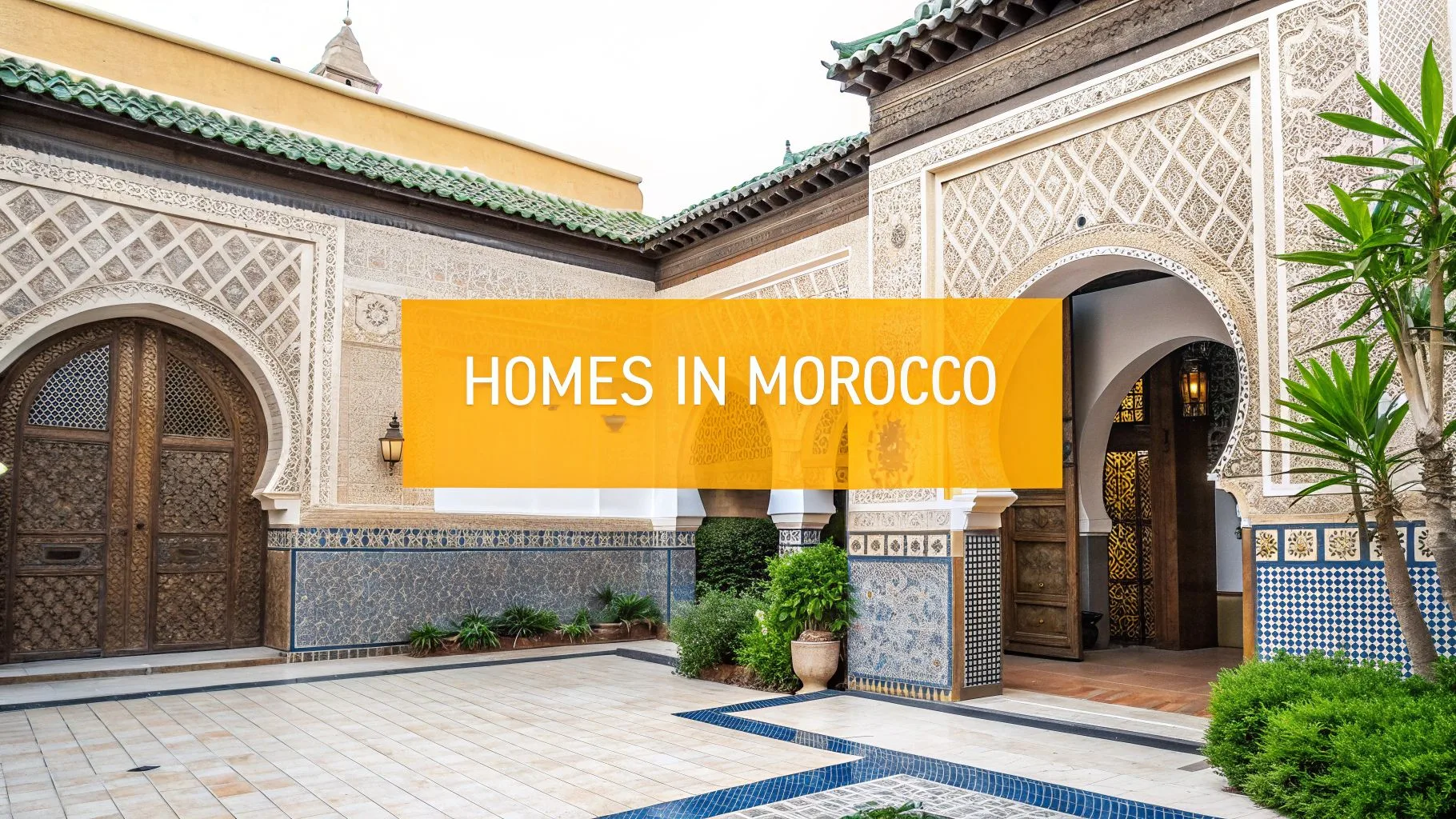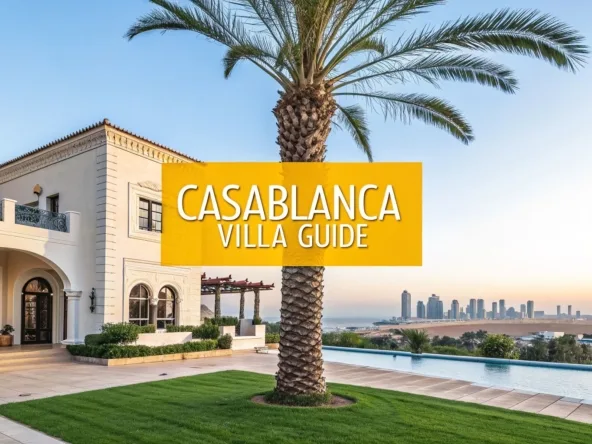The idea of finding a maison a vendre in Morocco is more than just a property search; it’s an invitation into a world of vibrant culture and smart investment. Whether you're picturing a traditional riad in the heart of Marrakech or a breezy modern villa in Essaouira, success hinges on one thing: getting to know the unique rhythm of the local real estate market before you dive in.
Decoding the Moroccan Property Market
Morocco’s property market is as rich and varied as its landscapes. You're not just buying bricks and mortar here; you're investing in a lifestyle woven into centuries of history and set against stunning natural backdrops. From the electric energy of a Marrakech souk to the salty air of the Tangier coastline, every region offers a completely different world for a prospective homeowner.
Think of the market as a collection of distinct micro-climates. A classic riad hidden deep within the Fes medina presents a totally different living experience—and investment case—than a sleek, contemporary apartment in Casablanca's financial hub. Grasping these local nuances is the crucial first step to making a choice you'll be happy with for years to come.
What's Fuelling the Market?
So, what makes Morocco so appealing to property buyers right now? It really comes down to a potent mix of political stability, a steadily growing economy, and major government investment in infrastructure. This has created a welcoming and secure environment for foreign investors, and the world is taking notice.
The real magic of Morocco is its ability to deliver both an incredible cultural experience and solid property value. People are drawn by the promise of a high quality of life, an enviable climate, and the potential for excellent rental returns, especially in the well-trodden tourist hotspots.
Types of Properties You'll Encounter
When you start looking for a maison a vendre, you’ll quickly see a few distinct styles of homes pop up again and again. Each has its own unique charm:
- Riads and Dars: These are the quintessential Moroccan homes, designed around a central open-air courtyard. They offer a private, peaceful sanctuary right in the middle of the ancient medinas.
- Villas: You'll typically find these on the outskirts of major cities or along the coast. They offer more space, private gardens, pools, and all the modern comforts you'd expect.
- Apartments: A practical and popular choice in bustling cities like Casablanca and Rabat, offering a convenient and modern base for urban life.
Starting your journey with this foundational knowledge helps you match your dreams with what's realistically available. It’s the key to making sure your search for a home in Morocco is as enjoyable as it is successful.
Navigating Property Prices And Locations
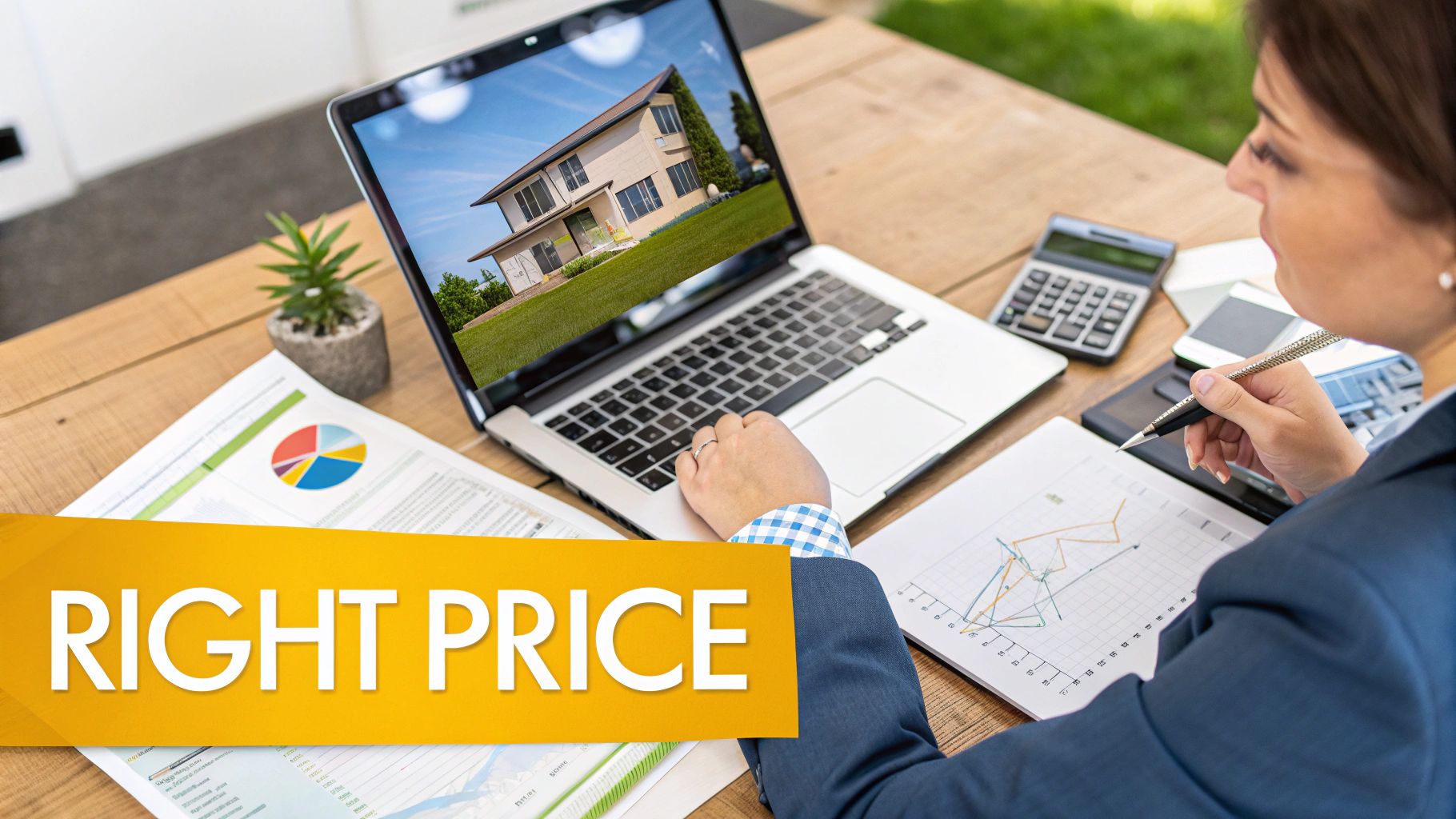
When you start searching for a maison à vendre in Morocco, you’ll quickly realise it’s a delicate dance between two partners: location and price. The two are inseparable. A property’s true value isn't just about its four walls and a roof; it’s deeply rooted in its surroundings.
Think of it this way: a beautiful riad tucked away in a quiet residential area offers a completely different experience—and commands a different price—than an identical one just steps from the vibrant chaos of a world-famous souk.
Morocco’s property market is a rich tapestry, with prices shifting dramatically from one city to the next, and even from one neighbourhood to another. This isn’t random; it's driven by powerful forces like international tourism, foreign investment, and local economic health. A bustling hub like Marrakech will naturally have premium prices, while a charming but less-travelled city like Meknes can offer incredible value for a similar-sized home.
Getting to grips with these regional nuances is your first, most crucial step. It’s what will empower you to find a home that fits not just your budget, but your vision for life in Morocco.
What Really Drives Property Values?
So, what are the key ingredients that cook up the asking price for a maison à vendre? Knowing what to look for will help you look past the listing photos and understand what you’re truly paying for.
- Convenience is King: Homes near international schools, quality hospitals, modern shopping centres, and good transport links will always fetch a higher price. It’s a simple rule of real estate, no matter where you are in the world.
- Economic Pulse: Cities with thriving economies and job markets, like the commercial powerhouse of Casablanca or the strategic port city of Tangier, tend to have higher and more resilient property values.
- The Tourism Factor: Any area with a strong tourist draw has built-in potential for rental income, and that directly inflates property prices. You’ll see this very clearly in coastal gems like Essaouira or the surfing hotspot of Taghazout.
The real trick is to look beyond the price tag and understand the story behind it. A high price in a tourist hotspot is an investment in future rental returns. A lower price in an up-and-coming area could be your ticket to significant capital growth down the line.
A Comparative Look At Key Locations
To really get a feel for the market, you have to compare apples to oranges—or in this case, a historic Marrakech riad to a breezy Essaouira villa. Neither is inherently "better," but one will undoubtedly be a better fit for your goals. If you're curious about a specific city's unique charm, you can explore why Marrakech is the perfect location for your holiday home to see if it aligns with what you're looking for.
To help you visualise the landscape, we’ve put together a quick snapshot of some of Morocco's most popular destinations for property buyers.
Regional Property Market Snapshot in Morocco
This table breaks down the key differences in property types, prices, and lifestyle across four major cities, giving you a clearer idea of where your search might lead.
| City | Popular Property Types | Average Price Range (per sq. meter) | Key Lifestyle Appeal |
|---|---|---|---|
| Marrakech | Riads, Modern Villas, Apartments | €1,500 – €3,500+ | Vibrant culture, bustling medina, strong tourism, and luxury living. |
| Essaouira | Coastal Dars, Villas, Apartments | €1,000 – €2,200 | Laid-back coastal vibe, artistic community, water sports, and historical charm. |
| Tangier | Apartments, Modern Villas | €900 – €1,800 | Strategic international hub, European influence, and rapid urban development. |
| Casablanca | Modern Apartments, Penthouses | €1,200 – €2,500 | Morocco’s economic powerhouse, cosmopolitan lifestyle, and business-focused. |
By thinking comparatively, you move from simply browsing listings to making a strategic choice. Understanding what each city truly offers—both in lifestyle and investment potential—helps you focus your energy where it counts, bringing you one step closer to finding that perfect Moroccan home.
The Legal Path to Property Ownership
Navigating the legal landscape is single-handedly the most important part of your journey to owning a maison à vendre in Morocco. Think of it as laying the foundation for your new home; get this part wrong, and everything built on top becomes unstable.
The entire process, while detailed, is actually quite clear once you understand the key players and documents involved.
The whole transaction pivots around one central figure: the notaire. In Morocco, a notaire is a government-appointed legal professional who serves as a neutral third party. Their job isn’t to represent you or the seller, but to ensure the sale is airtight—that every document is verified, every tax is paid, and the title is transferred correctly and legally. They work for the integrity of the sale itself.
Titre Foncier vs. Melkia: The Golden Rule of Ownership
Before you so much as glance at a legal document, you need to grasp the two fundamental types of land ownership in Morocco. This distinction is absolutely non-negotiable if you want a secure investment.
-
Titre Foncier (Titled Land): This is the gold standard, plain and simple. It means the property has a unique, indisputable title deed officially registered with the national land registry (Conservation Foncière). A Titre Foncier gives you absolute certainty about the property's boundaries, size, and rightful owner. For any foreign buyer, this is the only type of property you should ever consider.
-
Melkia (Non-Titled Land): This is a traditional form of ownership, often based on witness testimony and unsurveyed boundaries, documented with complex, handwritten deeds. While it's legally recognised for Moroccan citizens, Melkia properties are a minefield of potential ownership disputes and are incredibly difficult for foreigners to manage.
For any non-Moroccan looking for a maison à vendre, the rule is simple and absolute: only purchase a property with a clean and verified Titre Foncier. This is your ultimate protection against future legal headaches and guarantees you have a clear, marketable asset.
Key Documents in Your Purchase Journey
The path from making an offer to holding the keys is marked by two critical legal agreements, both prepared and overseen by the notaire.
First up is the Compromis de Vente, or preliminary sales agreement. This document legally binds both you and the seller to the transaction. It lays out all the agreed-upon terms: the final price, the property details, and any specific conditions (clauses suspensives), like securing a mortgage. When you sign this, you'll typically pay a deposit of around 10% of the purchase price, which the notaire holds safely in an escrow account.
The period between signing the Compromis de Vente and the final deed usually takes about three months. This gives the notaire time to do their due diligence—verifying the title, checking for any liens or debts on the property, and clearing urban planning permissions. For a deeper dive into the sequence of events, you can learn more about how to buy property in Morocco easily in our comprehensive guide.
Finally, you have the Acte de Vente, the definitive deed of sale. This is the moment ownership officially transfers to you. Once this document is signed and the remaining balance is paid, the notaire registers the sale with the Land Registry, making your ownership official and final.
Understanding the Associated Costs and Taxes
When you budget for your maison à vendre, remember that the sticker price is just the starting point. It’s crucial to factor in the closing costs, which generally add 7% to 10% on top of the purchase price.
Here is a simple visualisation of how professional home staging can prepare a property for sale, adding value before it even hits the market.
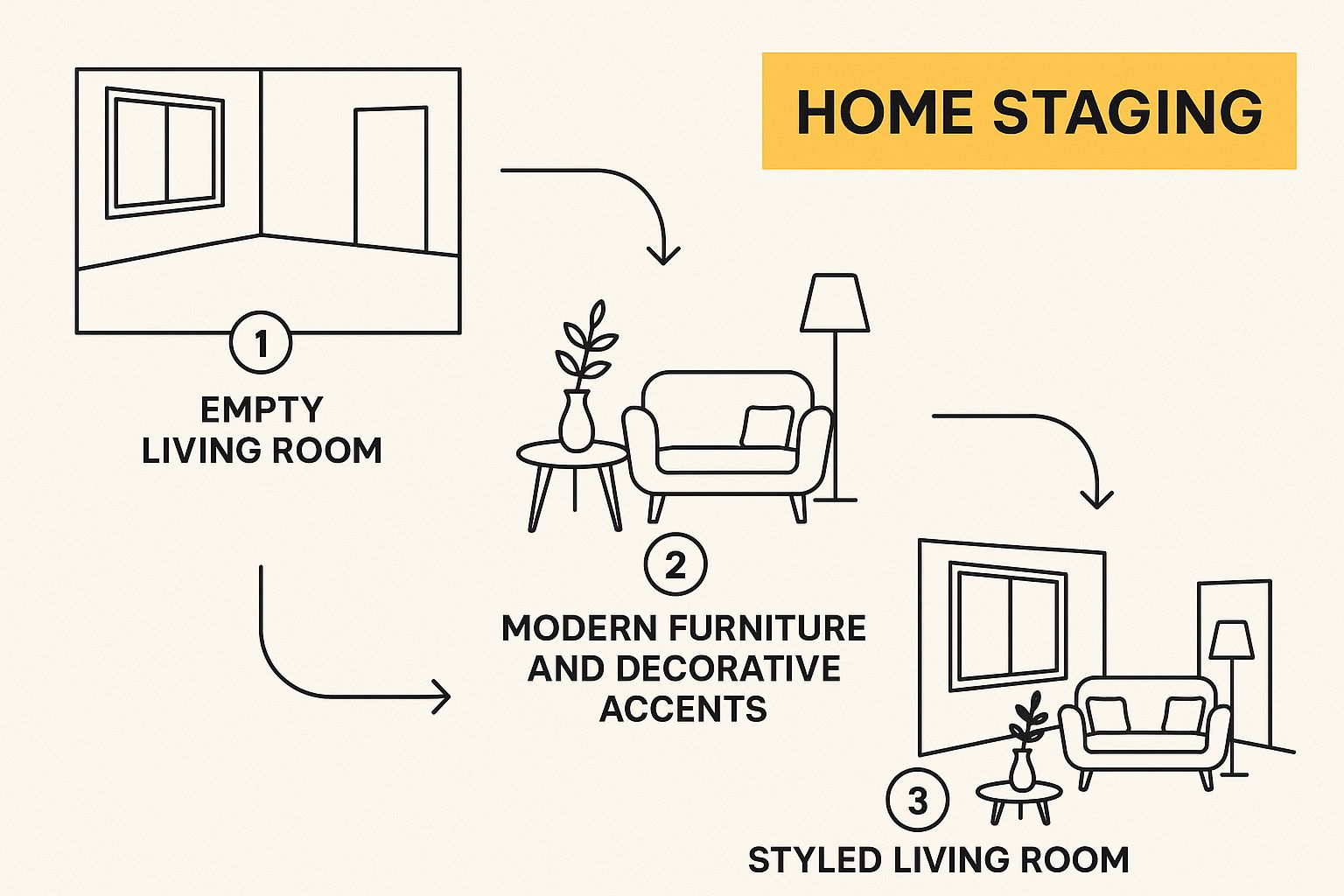
This illustrates how a bare space can be transformed into an appealing home—a crucial step that can influence a property's final sale price and the associated taxes.
These costs are a bundle of mandatory fees and taxes, all managed by the notaire. Here’s a typical breakdown of what you can expect:
- Registration Tax: This is the largest chunk, usually between 4% and 6% of the property's value.
- Notary Fees: These are regulated by the government and typically fall between 1% and 1.5%.
- Land Registry Fees: A fee for officially registering the new title deed in your name.
- Other Miscellaneous Fees: Small administrative charges for things like stamps and certificates.
By understanding these legal steps and their costs right from the start, you can move forward with confidence, ensuring your purchase of a Moroccan home is as secure as it is exciting.
Financing Your Moroccan Property Purchase
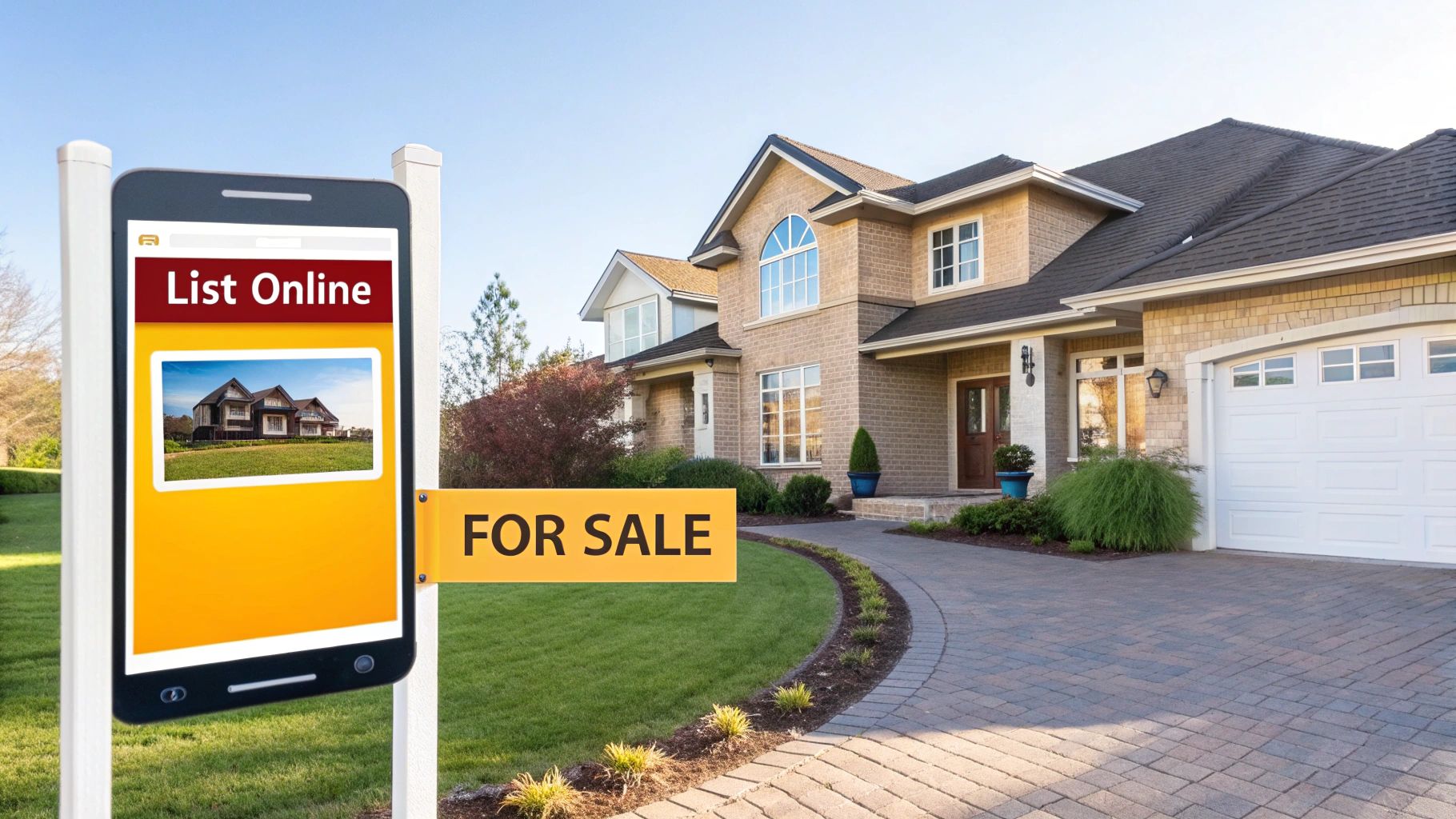
Once you’ve found the perfect maison à vendre, the next big step is sorting out the finances. For most international buyers, the thought of navigating another country's financial system can feel a bit overwhelming, but Morocco actually has well-established and accessible options for funding a property purchase.
Getting a handle on these options early in the game is smart. It helps you set a realistic budget and move forward with your purchase feeling prepared and confident. Whether you're looking at a local mortgage or transferring funds from abroad, each path has its own process.
Can Foreigners Get a Mortgage in Morocco?
The short answer is yes, absolutely. Moroccan banks are very familiar with lending to foreign nationals, especially for properties in the major cities and popular tourist spots. You can definitely get a mortgage here.
Of course, the specific terms you're offered will hinge on your personal financial situation and the property you're buying. The banks will take a good look at your application to make sure everything adds up.
To get the ball rolling, you'll need to pull together a file of personal documents. The exact list can vary slightly from bank to bank, but you should count on needing the following:
- Proof of Identity: A copy of your passport is essential.
- Proof of Income: Recent payslips, an employment contract, or tax returns that show you have a steady income.
- Bank Statements: Typically for the last three to six months, giving a picture of your financial health.
- Property Details: A copy of the preliminary sales agreement, the Compromis de Vente, for the home you plan to buy.
As a rule of thumb, Moroccan banks will often finance up to 70% of the property's value for non-residents. This means you’ll need to have a cash deposit of at least 30% of the purchase price, plus extra funds to cover all the closing costs.
The Essential Convertible Dirham Account
Here’s a piece of advice you can’t ignore: you must open a specific type of bank account in Morocco. This isn't just a helpful tip; it's a non-negotiable step for complying with the country's foreign exchange laws.
The account you need is called a convertible Dirham (MAD) account. Think of it as your official financial gateway into Morocco. It’s specially designed to receive your foreign currency—be it Euros, Pounds, or Dollars—and convert it into Dirhams to complete your purchase.
This account does two critical things. First, it creates a clean paper trail for the authorities, proving the money for your property came from outside Morocco. Second, and this is crucial for your long-term planning, it’s your ticket to getting your money back out. If you ever decide to sell, the proceeds can be repatriated out of Morocco through this very same account, all because you can prove the initial investment was foreign. For more on the benefits of buying here, check out our guide to investing in Morocco real estate.
Managing International Fund Transfers
When you're moving a significant amount of money from one country to another, the exchange rate is a massive factor. Even a tiny dip or rise can change the final amount by thousands of Dirhams.
Instead of just using your regular high-street bank, it’s often much smarter to use a specialist currency exchange service. They almost always offer better rates and lower fees. Planning your transfer carefully can save you a serious amount of cash—money that’s much better spent on your new maison à vendre than on transaction fees.
Negotiating Your Offer Like a Local
You've found it. After all the searching, you’ve pinpointed the perfect maison à vendre. You've waded through the legalities and have your financing lined up. Now for the thrilling part: making an offer. In Morocco, this isn't just a transaction; it's a conversation, a dance where cultural awareness and solid preparation are your best partners.
Before you even whisper a number, you absolutely must do your homework. This isn't about ticking boxes; it's about safeguarding your investment and ensuring there are no nasty surprises waiting for you down the line. You need to know the property inside and out, flaws and all.
Your Pre-Offer Checklist
Think of this as your intelligence-gathering phase. The more information you have, the stronger your hand when you sit down at the negotiating table. Your agent and notaire are your team on the ground, helping you uncover every last detail.
Here’s what you need to focus on:
- Get a Professional Survey: It might not be legally required, but commissioning a technical survey is one of the smartest moves you can make. An expert eye can spot hidden problems with the building's structure, plumbing, or electrics that could cost a fortune to fix later.
- Verify the Title Deed (Titre Foncier): This is non-negotiable, and your notaire will take the lead. They'll confirm the seller is the undisputed owner, check the exact property boundaries, and, most importantly, find out if there are any debts or legal claims attached to the house.
- Check Local Zoning and Plans: A quick check on any upcoming development plans in the area is always a good idea. You don't want to buy your dream home only to find a new high-rise is scheduled to be built next door.
Crafting an Offer They'll Take Seriously
With your due diligence complete, you’re ready to put a number on the table. Negotiation is woven into the fabric of Moroccan commerce, so don’t be shy about making an offer below the asking price. It’s expected.
However, your offer needs to be grounded in reality. A lowball figure without justification will get you nowhere. Instead, build your offer around what you’ve learned. Reference the cost of necessary repairs flagged in your survey or point to the sale prices of similar homes nearby. A well-argued offer immediately marks you as a serious, informed buyer.
Remember, negotiation in Morocco is as much about building a relationship as it is about the numbers. Be patient, be polite, and be prepared for a bit of back-and-forth. An aggressive, "take-it-or-leave-it" attitude will almost always backfire.
It’s Not Just About the Price
The sharpest negotiators know that a great deal isn't just about shaving thousands off the asking price. Flexibility on other terms can be just as valuable and often helps bridge the gap between you and the seller.
Think about negotiating these other elements:
- Included Furniture (Meublé): Is the property being sold furnished? You can often negotiate to keep specific pieces of furniture, which can save you a huge amount of money and logistical hassle, especially if you're moving from abroad.
- Essential Repairs: If your survey found issues, you have a couple of options. You can ask the seller to fix them before the sale is finalised, or you can negotiate a price reduction to cover the cost of you handling the work yourself.
- The Closing Timeline: The typical timeframe from the preliminary agreement (Compromis de Vente) to the final signing is about three months. But this isn't set in stone. If you need to move faster or the seller needs more time, the closing date can be a useful bargaining chip.
Lean on your real estate agent through this entire process. They live and breathe the local market, understand the etiquette, and can be an invaluable guide in framing your offer. They’ll act as your go-between, keeping the conversation productive and steering you towards a final agreement on your new maison à vendre.
Closing the Deal and Getting Your Keys
Your offer has been accepted—congratulations! Now comes the truly exciting part: the final stretch to getting the keys to your new Moroccan home. This last phase is less about haggling and more about careful, methodical execution, all expertly managed by your notaire.
Think of this stage as transforming a handshake agreement into an ironclad reality. It’s a structured process of signing key documents, transferring funds, and completing the legal registrations that make your ownership of the maison a vendre official and indisputable.
The Compromis de Vente and the Deposit
The first big step is signing the preliminary sales agreement, known as the Compromis de Vente. This is a legally binding document that lays out every single term of the sale, from the price you agreed on to any specific conditions. It’s the detailed blueprint for the entire transaction.
Once you sign, you'll need to pay a deposit, which is typically 10% of the purchase price. This money doesn’t go to the seller directly. Instead, it’s held securely in the notaire's escrow account, which protects everyone involved. It proves your commitment as a buyer and keeps the funds safe until the deal is done.
The Waiting Game: What the Notaire Does Next
With the Compromis de Vente signed, a crucial waiting period begins. This usually lasts around three months, but it's far from idle time. Behind the scenes, your notaire is working diligently, conducting all the necessary legal checks to make sure the transaction is completely secure.
This is where the notaire truly earns their fee. Their checklist includes:
- Verifying the Title: They’ll meticulously check the property's title deed (Titre Foncier) to confirm the seller is the undisputed owner and that there are no hidden mortgages, liens, or legal claims.
- Checking Urban Planning Compliance: The notaire ensures the property adheres to all local zoning laws and that any construction or renovations have the proper permits.
- Clearing the Right of Pre-emption: In Morocco, local authorities sometimes have the "right of pre-emption," meaning they get the first option to buy. The notaire officially notifies them, and the authorities usually have two months to respond (they rarely exercise this right, but the step is mandatory).
This period also gives you the time you need to finalise your mortgage arrangements if you're not a cash buyer.
The three-month window between the preliminary agreement and the final act is a cornerstone of the French-inspired Moroccan legal system. It is designed to provide ample time for thorough verification, protecting both buyer and seller from future complications.
The Acte de Vente: The Final Signature
The grand finale of this whole process is signing the Acte de Vente, the final deed of sale. This is the moment you've been working towards. You, the seller, and the notaire will gather to sign this last, conclusive document.
Before you put pen to paper, the notaire will read the entire deed aloud to make sure everyone understands and agrees with every clause. At this meeting, you’ll also need to have transferred the remaining balance of the purchase price to the notaire's account.
Once the ink is dry and the final payment is confirmed, the keys to your new maison a vendre are officially yours.
After the Purchase: A Few Final Steps
You're a homeowner in Morocco! But before you can truly relax, there are a few final administrative tasks to tick off the list.
Your notaire will handle the official registration of your new title at the Land Registry (Conservation Foncière). After that, it’s over to you to:
- Set Up Utilities: Get the electricity, water, and internet accounts transferred into your name.
- Arrange Insurance: Securing a good homeowner's insurance policy is vital to protect your new investment.
- Register Locally: You might need to register with the local commune, especially for residency purposes.
Getting these things sorted quickly will help you settle into your new Moroccan home smoothly and with complete peace of mind.
Answering Your Key Questions About Buying in Morocco
Stepping into the Moroccan property market for the first time? It’s natural to have a lot of questions. Finding your ideal maison a vendre feels much less daunting when you have solid answers to the most common concerns.
Think of this section as your practical guide to navigating the process. We’ll cut through the complexity on everything from ownership rights to final costs, giving you the clarity you need to move forward with confidence.
Can a Foreigner Actually Own Property in Morocco?
Yes, absolutely. Morocco is quite open to foreign investment, and non-Moroccan citizens can legally purchase and own property with a full freehold title. This title is called a Titre Foncier, and it gives you the exact same ownership rights as a Moroccan citizen would have.
There is one important exception to be aware of: agricultural land. Foreigners are restricted from owning this type of land directly. This is precisely why a good notaire is your best friend in this process. They will do the due diligence to confirm the property you want has a clean Titre Foncier and isn't classified as agricultural, making sure your purchase is secure and fully compliant with local laws.
What Should I Budget for Closing Costs?
The sticker price is just the starting point. To avoid any last-minute financial surprises, you should plan on adding 7% to 10% of the purchase price for closing costs.
These costs are a collection of official taxes and fees, all handled by the notaire. Here’s a rough breakdown of what that covers:
- Registration Taxes: This is the biggest slice of the pie, usually running between 4% and 6%.
- Notary Fees: The notaire's fee is regulated by the government and is typically around 1% to 1.5%.
- Land Registry Fees: A standard fee for officially recording the new title deed in your name.
- Miscellaneous Charges: A small amount for administrative necessities like stamps and official certificates.
Building this buffer into your budget from day one means you'll be well-prepared when it's time to finalise the purchase of your maison a vendre.
Do I Really Need a Moroccan Bank Account?
Yes, this is non-negotiable. Opening a Moroccan bank account isn't just a good idea; it's a practical necessity for any foreign buyer. You'll need to open a specific type called a convertible Dirham (MAD) account.
This account is designed for one main purpose: to receive your funds in a foreign currency (like Euros or Dollars) and convert them into Moroccan Dirhams for the transaction. It creates an official, transparent record for the exchange control authorities, proving the money for your property came from outside Morocco.
This official paper trail is your key to financial flexibility down the road. Should you ever decide to sell the property, this account makes it simple to repatriate the proceeds of the sale back to your home country without any bureaucratic headaches.
Is It Worth Hiring a Real Estate Agent?
You could go it alone, but for a foreign buyer, working with a licensed and reputable real estate agent is almost always the smarter move. A good agent does so much more than just send you listings.
They bring indispensable local market knowledge to the table, guide you through the nuances of negotiation (which can be very different here), and connect you with their network of trusted professionals, from notaries to building surveyors. They become your advocate on the ground, helping you sidestep common mistakes and ensuring your property journey in Morocco is a smooth and successful one.
Navigating the Moroccan property market requires expert guidance and local knowledge. At Rich Lion Properties, we provide the support you need to find and secure your dream home with confidence. Explore our services and start your search today.
